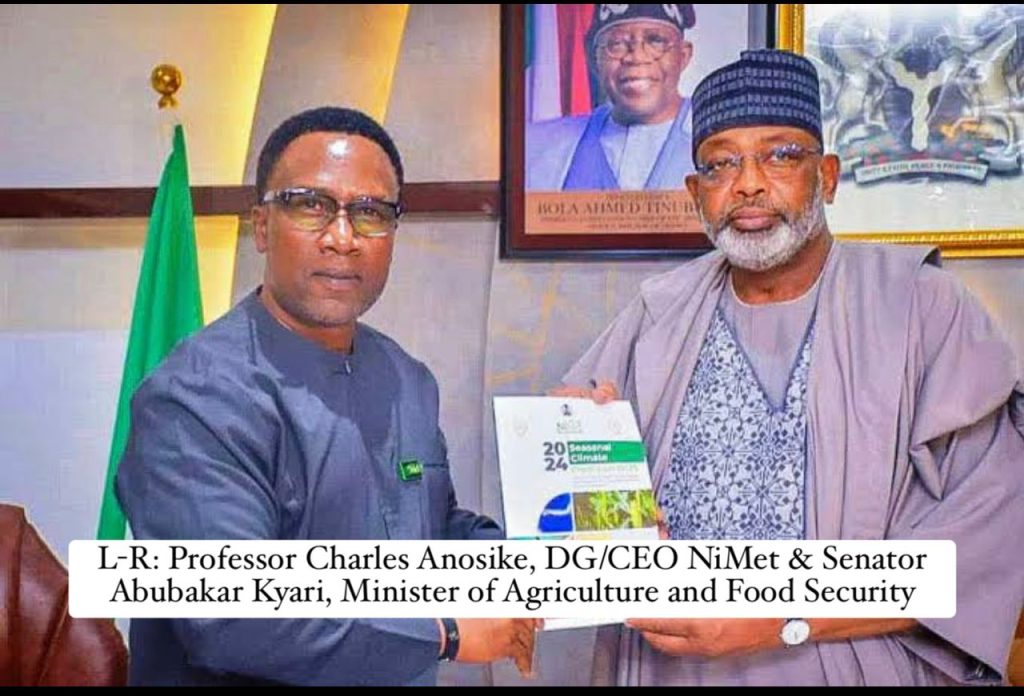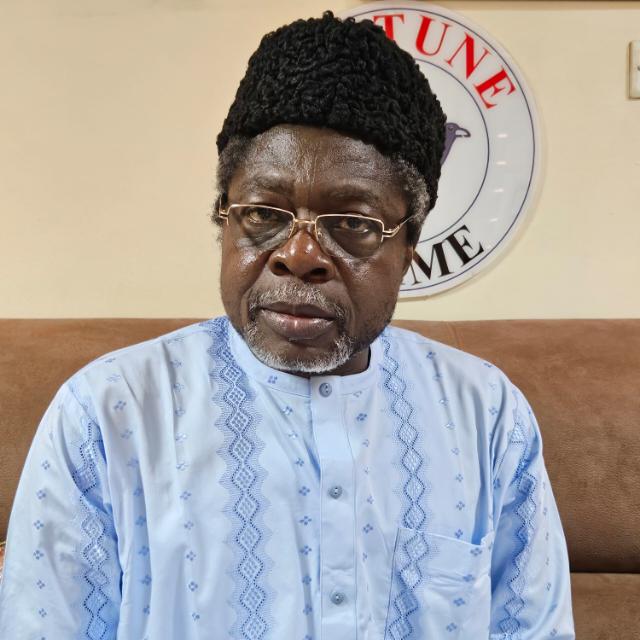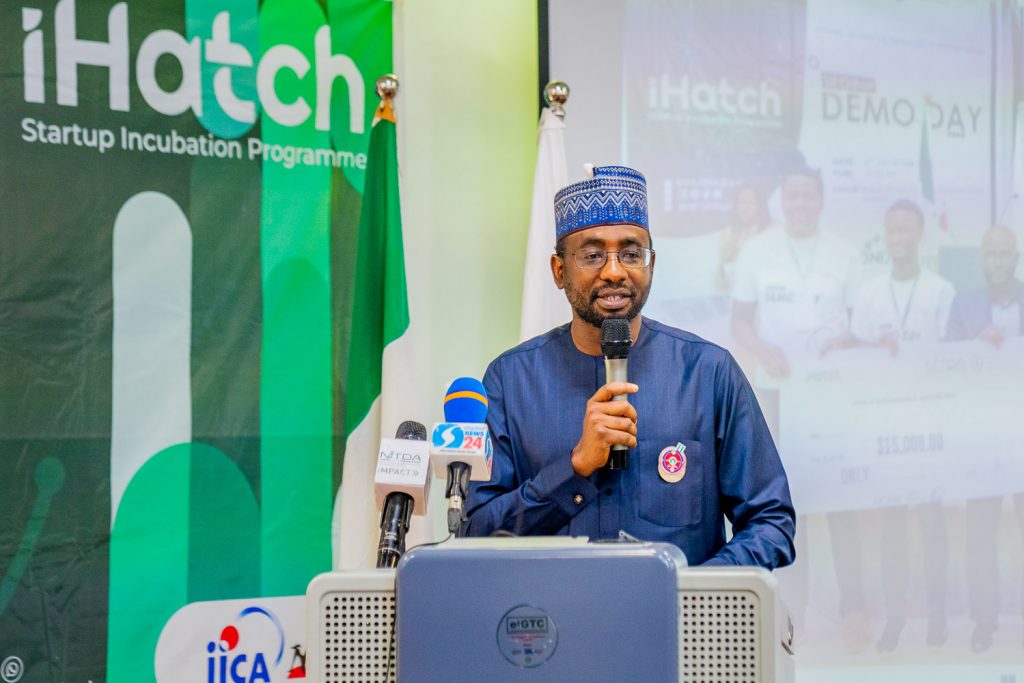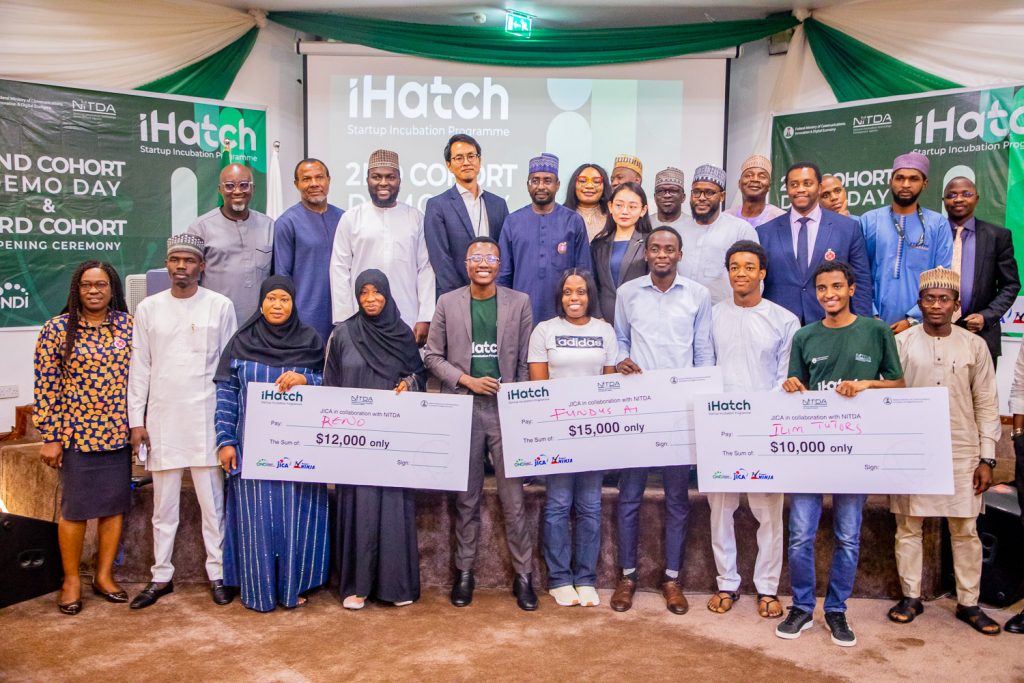Opinion
Repositioning Nigeria’s telecom sector with renewed strategy
Published
7 months agoon
AJAGBE ADEYEMI TESLIM
SPONSORED BY: H&H
The approach to repositioning Nigeria’s telecom industry to meet global standards is taking a new dimension with renewed hope as the Ministry of Communications, Innovation & Digital Economy is putting up new strategies that will enhance innovation and the digital economy. Abolaji Adebayo analyses the strategies.

Adebayo
For the progress and innovation of the sector, the Minister of Communications, Innovation and Digital Economy, Dr. ‘Bosun Tijani presented a strategic blueprint that will guide the government and other stakeholders in repositioning the industry.
According to the minister, “This document is a critical launchpad in our journey towards a Nigeria that thrives in the digital age in alignment with the Renewed Hope Agenda of President Bola Ahmed Tinubu. As we reflect on our rich history as a country and today’s dynamic challenges, our path to greatness will be forged through a clear vision, constructive collaboration, and a commitment to our common good. This strategic blueprint articulates a vision for Nigeria that builds on the transformative power of digital technology and innovation to diversify and deepen our economy.”
The sector
Though telecommunication is one of the sectors that has been growing in strength in Nigeria, its growth is still below the expectation considering the development of technology across the world.
The industry has been facing various challenges including cybersecurity and online fraud, regulatory burden, multiple taxation, vandalism of telecommunication infrastructure, right-of-way challenges, access to foreign exchange, and inter-industry indebtedness, among others. These have been the major bottlenecks hindering the progress of the sector.
For optimum performance of the sector, there is a need for the government, working in collaboration with the stakeholders, to reposition the industry hence, the creation of a roadmap to build innovation in the telecom sector and accelerate the diversification of the Nigerian economy by enhancing productivity in critical sectors through technological innovation.
Target
“In a world where digital transformation and innovation is fast becoming a catalyst for economic progress, we are at a critical moment as a nation in our journey towards a more inclusive and prosperous future. The intersection of a strong digital economy and our innovative and youthful population presents us with a unique opportunity to chart a course toward prosperity, inclusion, and global relevance.
“President Tinubu’s Renewed Hope Agenda has at its core, a recognition of the power of technology and innovation as enablers of economic growth and development. It is a call for us to take advantage of the opportunities presented to us with a spirit of determination and conviction,” the minister stated.
Strategy
To achieve the target in the economy recovery through a robust telecom and industry with innovation, the minister has set us a framework that encompasses five key pillars that include Knowledge, Policy, Infrastructure, Innovation, Entrepreneuship & Capital (IEC), and Trade.
Each pillar, according to the minister, is integral to the mission and interconnected with others, forming the foundation of the strategy.
He said: “Knowledge is the cornerstone upon which innovation thrives, and is built upon the bedrock of sound policies. Infrastructure provides the essential backbone for a thriving digital economy, while innovation and entrepreneurship drive economic
diversification. Trade, the fifth pillar, represents our commitment to global collaboration and partnerships, recognising that innovation knows no borders.
“As we embark on this transformative journey, we do so with an unwavering sense of purpose. We understand that the road ahead may be challenging, but it is through these challenges that we find the impetus to evolve and adapt. Together, we will harness the power of technology to elevate Nigeria’s standing on the global stage, create sustainable employment opportunities, and improve the quality of life for all Nigerians.
I extend an open invitation to all stakeholders, both within and outside government, to unite in this collective endeavour. It is our shared vision, ambition, and commitment that will drive us towards a Nigeria that not only embraces the digital age but leads it.
Let us rise together and seize this moment in our history to shape a future that we can all be proud of.”
Agencies
The agencies that will implement the strategies to achieve the set goals include Galaxy Backbone, which provides reliable ICT infrastructure, broadband network, database management, collaborative platforms, and related services to all government agencies to facilitate efficient e-government operations and digital transformation; National Communications Commission (NCC), established to regulate and promote investment in the telecommunications industry, ensuring fair competition among operators, consumer protection and the development of a robust and inclusive communication network; the Nigerian Communications Satellite Limited (NigComSat) operates and provides satellite communication services, supporting technological development and facilitating national and global connectivity. Nigeria Data Protection Commission (NDPC) is another agency under the Ministry that oversees the implementation of the Nigeria Data Protection Regulation towards safeguarding the rights of natural persons to data privacy, preventing manipulation of personal data, and ensuring that Nigerian businesses remain competitive in international trade; Nigerian Postal Service (NIPOST) provides efficient and affordable postal services, promotes the use of digital technology and develops new products and services aimed at increasing market share and creating new markets in the postal sector.
The National Information Technology Development Agency (NITDA) is saddled with the responsibility of developing, regulating, and promoting the technology sector by driving digital innovation, capacity/talent development, policy formulation, and public-private partnerships to ensure universal access and technological advancement; while
Universal Service Provision Fund (USPF) was set up to promote universal and affordable access to telecommunications services in underserved and unserved areas, bridging the digital divide and facilitating greater social equity and inclusion.
With all these agencies, repositioning the industry seems seamless. Stakeholders urged the government to ensure each agency is given the autonomy to do its job, saying regulatory capture as experienced during the former regime will yield no result.
An intuitive approach to increase Nigeria’s national output is to increase factor inputs (Labour and Capital) but multiple major economic theories recognise the central importance of ongoing technological progress and efficiency gains for increasing national output and income. Some of these justifications include the fundamental economic model of Cobb-Douglas Production Function which shows that improved Total Factor Productivity (TFP) directly increases output without added inputs. (Cobb & Douglas, 1928 ). Schumpeterian Growth Models also argued that sustained growth requires “creative destruction” from disruptive innovations and technologies (Schumpeter, 1942 ).
Likewise, Solow Residual Theory showed that TFP, not inputs, explained most economic growth in advanced countries, and raising TFP will increase output when capital growth slows in countries like Nigeria (Solow, 1957 ). Endogenous Growth Theory also shows that TFP is the key driver of sustained economic growth rather than just capital accumulation (Romer, 1990 ).
Similarly, a more recent New Growth Theory demonstrates that economic growth is driven by “recipe accumulation” as new ideas and technologies boost productivity i.e., policies that promote innovation and technology adoption will increase TFP and subsequently increase national income (Romer, P.M. (1990).
The pillars
As earlier explained, the strategies to reposition the sector are based on five pillars as presented by the Minister.
Knowledge
In the rapidly interconnected world, knowledge is the foundation upon which countries build a robust and sustainable economy.
“As a critical prerequisite, knowledge influences how we generate innovations and technologies that drive economic growth, expand the talent pool to drive competitiveness, improve productivity, and inform evidence-based policymaking, amongst others.
“As a Ministry, our mandate of contributing to the diversification of the Nigerian economy through enhanced technical efficiency facilitated by technological innovation rests on the effective application of knowledge. To this end, knowledge forms the critical foundation of our strategic blueprint for the next four years.”
With this strategy, the government targets to accelerate the growth of Nigeria as a global technical talent hub and net exporter of talent; deepen and accelerate Nigeria’s position in global research in key technology areas; and raise the complexity and dynamics of its economy by significantly increasing the level of digital literacy across the country.
Policy
Tijani stated that the government will come up with policies that will enable innovation, entrepreneurship, and inclusive growth.
“When properly designed and executed, the policy provides a platform for innovation and entrepreneurship to thrive. Effective policy provides regulatory clarity and necessary incentives for an environment where businesses and innovators are empowered to grow. Over the next four years, our policies will focus on encouraging investment, research and development, and the protection of intellectual property. By so doing, we will attract talent and investment to stimulate our innovation ecosystem. In addition, this pillar will prioritise the use of policy to drive universal access to the benefits of a dynamic digital economy.”
Infrastructure
On infrastructure, the government indicates its commitment to building the critical infrastructure required to power a strong digital economy, recognising that economic prosperity is linked to a robust digital foundation.
“Our emphasis on building stronger digital infrastructure extends beyond connecting people but also focuses on economic empowerment and creating opportunities for inclusion. With improved access to quality broadband, and upgraded critical services, this pillar will catalyse a digital transformation that impacts our entire population.
“We will connect communities and businesses by implementing our broadband strategy to ensure that everyone is carried along. Managing our spectrum efficiently will create pathways for the growth of new technologies and improve access to government services. Our plans for our postal service and satellite communication infrastructure re-affirm our commitment to leveraging improved digital public infrastructure to deliver inclusive economic growth for all,” Tijani said.
IEC
In the rapidly evolving global technology landscape, innovation, entrepreneurship, and access to capital are critical components of a strong digital economy. With this strategy in place, the government is providing a roadmap for Nigeria to harness the potential of these three pieces as catalysts for the transformation of the digital economy.
The strategy is said to be the driving force behind the creation of an environment that encourages innovation, supports entrepreneurship, and attracts the required capital to deliver on its ambitions.
“In this pillar, we outline a set of initiatives that recognise the importance and necessity of these 3 inputs—innovation, entrepreneurship, and capital—for delivering a vibrant and inclusive digital economy. This forward-looking approach keeps our innovation ecosystem ahead of the curve and future-proofs our economy.”
The Minister said the objective is to stimulate the growth and sustainability of startups, with a specific focus on those developing innovative solutions for critical sectors in the economy.
Trade
By Trade as a strategy, the federal government is showing commitment to position Nigeria as a major player in the African and global technology ecosystem. As a rapidly growing economy, with the ICT sector contributing 18.44% to Nigeria’s GDP in Q2 2022, and e-commerce spending projected to grow to $75 billion by 2025 (Statista), the primary goal is to enhance Nigeria’s participation in the global technology trade over the next four years.
“A core part of this pillar is our aim to improve Nigeria’s ranking in the ECI (Economic Complexity Index) Technology Index. This pillar articulates our plan to leverage technology trade as a catalyst for economic growth and collective regional prosperity. Through deliberate partnerships, novel trade policies, and investments, we will strengthen our position as a top technology centre that provides strong leadership in defining Africa’s digital future.”
Last line
While it is believed to be the right approach to reposition the telecom industry, stakeholders harp on strict implementation to achieve the target goals.
Culled from New Telegraph
You may like
Opinion
NiMet’s Renewed Collaboration With Agriculture Ministry Is Good For The Nigerian Economy
Published
7 days agoon
May 6, 2024NiMet’s Renewed Collaboration With Agriculture Ministry Is Good For The Nigerian Economy
By Dr. Uche Nworah
The Federal Ministry of Agriculture and Food Security is a Ministry of the Federal Government of Nigeria that has the mandate to ensure food security in crop, livestock and fisheries.

The ministry is also tasked to stimulate agricultural employment and services, promote the production and supply of raw materials to Agro- allied industries, provide markets for the products of the industrial sector, generate foreign exchange and aid rural socio-economic development throughout Nigeria.
The Nigerian Meteorological Agency (NiMet), is a Federal Government of Nigeria agency charged with the responsibility to advise the Federal Government on all aspects of meteorology. NiMet is also tasked to project, prepare and interpret government policy in the field of meteorology; and to issue weather (and climate) forecasts for the safe operations of aircrafts, ocean going vessels and oil rigs.
The Nigerian Meteorological Agency (NiMet), and the Federal Ministry of Agriculture and Food Security have in the past made moves to strengthen their existing relationship towards improving agricultural production and food security in Nigeria. The Ministry and NiMet had signed an MoU on the 3rd of March, 2022, to collaborate in a lot of areas including development of a dash-board for early warning systems, capacity building for staff of the Ministry and other stakeholders on accessing and interpreting information on meteorological parameter changes, and the provision of agro-meteorological advisory services to farmers on specific agricultural commodities. It would seem as if things quietened down after the MoU was signed.
However, at a joint press briefing on NiMet’s 2024 Seasonal Climate Prediction (SCP), at the instance of the Honourable Minister of Agriculture and Food Security, Senator Abubakar Kyari, on Tuesday, 16th April, 2024, the Honourable Minister and the Director General, Chief Executive Officer of NiMet, and Nigeria’s permanent representative with World Meteorological Organization (WMO), Professor Charles Anosike, resolved to strengthen the relationship and make it stronger. The Honourable Minister said at the press briefing; “Your presence here today, at our headquarters, marks another milestone in the deliberate and desirable collaboration and co-operation between our Ministry and your agency. Over the years, critical sectors of the economy, such as aviation, maritime, and agriculture, have come to rely on the Seasonal Climate Prediction published by NiMeT usually in the first quarter of the year. The reliability of the Seasonal Climate Prediction is indicated by increased recourse to the weather advisories contained therein”.
The Honourable Minister also said that NIMET’s Seasonal Climate Prediction can assist in shaping agriculture in Nigeria with regard to information about the pattern and duration of rainfall across the country’s agronomic zones, when to grow and length of growing season, as well as dry spells that could occasion loss of agricultural investment, where remedial measures are not taken. This in turn helps to boost the adaptive capacity of farmers. Regrettably, there have been farming seasons in Nigeria when farmers did not take advantage of the institutional advice from NIMET, and on their own misread the rainfall pattern, only to face dry spells that invariably ruined their crops and livelihoods.
In his remarks, Professor Anosike thanked the Honourable Minister for his leadership and the kind gesture to strengthen the relationship between NiMet and the ministry. “NiMet wishes to build on the database of farmers that the ministry has. Already NiMet disseminates information about seasonal climate prediction through formal engagements with farmers , and through the media such as the BBC, social media, Radio Nigeria and through national television stations.
However, a lot of gaps still exist within the dissemination space. Our goal is to reach as many Nigerians as possible with timely, accurate and actionable weather and climate information as part of NiMet Early Warning Drive”
Continuing, Professor Anosike said; “Food security requires consistent collaboration with all stakeholders. The SCP as predicted are being manifested but the challenge remains disseminating the contents to over 70 million farmers in Nigeria. Farmers need to be equipped with information and other resources to make climate resilient decisions”.
It is noteworthy and encouraging that weeks after the joint press briefing between the Federal Ministry of Agriculture and Food Security and NiMet, there are evidences of the renewed collaboration. This is positive and will benefit the Nigerian economy. Knowledge is power and if Nigerian farmers have weather and climate information translated in their local languages, they will be able to make climate resilient decisions such as knowing when to plant, what species of plants and seeds to plant and when to harvest to achieve greater yield.
The 2024 Seasonal Climate Prediction (SCP) released by NiMet provides an outlook of climate variables to help improve decision-making across all sectors of the economy. NiMet’s SCP for 2024 which was originally released in February 2024, forecasts normal on-set of rains over the northern states.Borno, Abia and Akwa Ibom states are predicted to have early on- sets. An early end to the season is predicted for parts of Yobe, Jigawa, Sokoto, Kebbi, Kano, Kaduna, Plateau, Nasarawa, Taraba, Gombe, Bauchi, Cross River, Ebonyi, Ogun and Lagos states.
A late secession is predicted over the southern states of Bayelsa, Rivers, Akwa Ibom, Ondo, Ekiti and part of Edo, Delta, Ogun, Oyo, Kogi, Kwara, FCT, Niger and Kaduna states.
Day and Night time temperatures for January to May is predicted to be warmer than normal in most parts of the country. Also, most of the North is anticipated to be cooler in March.
The Ministry and NiMet have re-intensified efforts at disseminating NiMet’s seasonal climate prediction (SCP), using FRCN network service, local radio, local and national press, national and local television. They are also using social media platforms. Applying the multi-step information flow model will require social media savvy stakeholders picking up the information online and sharing same to the farmers in their various communities.
A critical aspect of the dissemination is the physical downscaling of the SCP information to farmers in the various communities. This will require the support of the various states ministries of agriculture and NGOs operating in the agricultural space. They should support current downscaling efforts by the ministry and NiMet. From the schedule released by the Federal Ministry of Agriculture and Food Security, and NiMet, downscaling of SCP information to farmers in the six geopolitical zones have been scheduled as follows; Ondo (13th May), Imo (15th May), Delta (17th May), Niger (22nd May), Sokoto (4th June) and Borno (6th June). Farmers, civil society organizations, states ministries of agriculture, the media and other stakeholders can help in sensitizing the farmers to attend on the dates stated for their zones.
This initiative by the two MDAs is viewed as a positive step towards enhancing food security in Nigeria. It will empower our farmers, and has the capacity to mitigate the perennial challenges of climate variability. It will at the same time contribute towards sustainable resilience in the agricultural value chain.
The full SCP report can be downloaded from www.nimet.gov.ng. The report is also available from the Federal Ministry of Agriculture And Food Security Abuja, and State Ministries of Agriculture.
Dr. Nworah, a public affairs commentator wrote from Lagos.
Opinion
America, Iran and the abuse of democracy, human rights, by Hassan Gimba
Published
7 days agoon
May 6, 2024America, Iran and the abuse of democracy, human rights, by Hassan Gimba
“One of the shrewdest ways for human predators to conquer their stronger victims is to convince them steadily with propaganda that they are still free.” N. A. Scott, American author.

Every human being currently living on earth came to this world and saw the United States of America posing as the cradle of democracy, a bastion of freedom and a citadel of human rights.
For those of us in Africa, especially West Africa, and particularly those along the coastline, that America ruptured family cohesion, ties and lineage by forcefully taking our able-bodied forefathers and enslaving them, was either forgotten, forgiven, or both.
That after it was forced to abolish slavery by a changing world, it found a way to continue enslaving our able-bodied and intelligent youths in the name of providing greener pastures for them, which was either overlooked, not realised, or both.
As time went on, that it labelled those who wanted the best for their people as communists and demonised them, creating a bipolar world was either accepted as gospel truth by those who did not know the truth or parroted by those who were recruited to do that, or both.
That the then Eastern bloc (or communist/socialist countries), under the guidance of the Union of Soviet Socialist Republics (USSR), and its star boy, Fidel Castro of Cuba, all lined up to fight apartheid for African freedom was either lost on us or remained unappreciated, or both.
That Fidel Castro’s Cuba fought enslavers out of Angola for Angolans to taste freedom, training African youths in its universities and supplying Africa with medical doctors and free drugs while we still preferred to rush to America where we paid for everything through the nose reflected our slave mentality or lack of capacity to embrace truth, or both.
Truth is, we all grew up looking up to Uncle Sam as someone who cared for us in the third world, even when it was propping up the apartheid regime in South Africa or being a pillar of support to Ian Smith in Rhodesia, now Zimbabwe (Southern Rhodesia) and Zambia (Northern Rhodesia). Many of us did not see anything wrong in its support for Joshua Nkomo against the pan-Africanist Robert Mugabe.
For a long time, America has been working on the psyche of youths, especially in Africa, the Middle East, Asia and the communist/socialist countries to make them see their society as primitive and America as modern. The youths see their cultures and traditions as backward and archaic, their religion as stories of old, and Western depravity as the new religion.
It found a way in 1989 to infiltrate and brainwash Chinese students to rise against their country, demanding “political and economic reforms and greater respect for human rights”. The protesters gathered in Tiananmen Square in central Beijing, where they were forcefully evicted by military units, who killed a lot of them.
Tiananmen Square, or Tian’anmen Square, is a city square, measuring 765 x 282 metres, in the city centre of Beijing, meaning “Gate of Heavenly Peace”. The square contains the Monument to the People’s Heroes, the Great Hall of the People, the National Museum of China, and the Mausoleum of Mao Zedong, who proclaimed the founding of the People’s Republic of China in the square on October 1, 1949. It has great cultural significance in Chinese history.
America and its Western allies and propaganda machines did not allow what happened in China to be swept under the carpet or forgotten easily. It kept hammering on China’s “evil of repression”, that it emasculated and silenced the voice of the voiceless because that’s what students are. It told the world that China was an enemy of freedom, free speech, free association and democracy which it proclaimed as the only acceptable world order, despite its dalliance with repressive, autocratic and monarchic regimes, around the world.
Now fast-forward to 2024 and the pinching shoe is in America’s feet. Its students in no fewer than 15 universities and counting, with Columbia University in the lead, are protesting with the battle cry “Free, Free Palestine” for the freedom of Palestine that has been under Israel’s subjugation for decades.
America, the self-acclaimed doyen of freedom of association and speech, the guardian angel of democracy, is cracking down on the students for freely associating and using free speech to seek the freedom of another country. So far, scores of them have been arrested, some suspended, and some dismissed outright, while lecturers have been threatened with sack if they showed any sort of support to the students’ cause.
But that will hardly deter academics used to free speech as a first nature. One professor in the university bravely declared: “This is about a genocide being carried on with American money and with American weapons, against a people enduring generations of occupation.”
In a cheeky, and poignant, role reversal, Iran, which had suffered American instigation of its youths over time and had to deal with as it deemed fit, called on the US not to jeopardise democracy, freedom of association and free speech.
Shiraz University, a globally ranked university in Iran, just announced that it will grant scholarships to the students of American and European universities who have been expelled for supporting Palestine. It is also going to hire professors who have been fired or threatened with sacking for their stance towards Palestine.
Before the breeze blew and we saw the anus of the fowl, this was what America was doing to others all over the world – instigating youths against their fatherland, and when the country attempted to rein in its citizens, they would cry foul. They will then dole out scholarships, grants or work and Green Cards to those who fought against their country and its system.
In the words of Samuel P. Huntington, an American political scientist and academic, “The West won the world not by the superiority of its ideas or values or religion…but rather by its superiority in applying organised violence. Westerners often forget this fact; non-Westerners never do.”
Now America is receiving a dose of its medicine and it has failed to behave better than those countries it accused of truncating democracy, free association, free speech and human rights abuses.
Truth, it is said, is the only one that lasts. Falsehood and hypocrisy are just as temporary as the time it will take to blindfold the people.
What America is showing the world today is exactly the echo of the time immemorial words of Abraham Lincoln, its 16th president, who issued the Emancipation Proclamation that declared slaves forever free: “You can fool some of the people for all of the time, and all of the people for some of the time, but you cannot fool all of the people for all of the time.”
Hassan Gimba is the Publisher and Editor-in-Chief of Neptune Prime.
Opinion
IHATCH: JAPAN GOVERNMENT TASK TO LEVERAGE NIGERIA’S YOUTHFUL POPULATION- DG NITDA
Published
5 months agoon
December 3, 2023
By James Ishaku
As part of the current administration of President Bola Tinubu’s commitment towards creating meaningful opportunities for Nigerian youths, the Director General Of the National Information Technology Development Agency (NITDA), Kashifu Inuwa CCIE has called on the government of Japan to leverage on the youthful population through strategic talent partnership that will nurture and build a workforce that can be exported.
The DG made the call at the Ihatch startup incubation programme 2nd cohort demo day and 3rd cohort opening ceremony organised by the subsidiary of the agency, Office for Nigerian Digital Innovation (ONDI), in partnership with Japan International Corporation Agency (JICA) in Abuja.
Inuwa noted that the ihatch 5-month free intensive incubation programme executed by the ONDI and hosted within the National Centre for Artificial Intelligence and Robotics (NCAIR) is designed to help Nigerian tech entrepreneurs refine their business ideas through a series of coaching, lectures, and booth camps to develop scalable and adaptable business models that willfocus on youth, innovation, entrepreneurship, and technology.
He added that the incubation programme will be held simultaneously in Abuja, Lagos, Port Harcourt, Gombe, and Kano and JICA has agreed to extend the Fourth Cohort across each of the 36 States and the FCT. This is to enable wider reach and to stimulate the startup ecosystems across the States.
The DG stated that not fewer than 1,218 applications were received for the Second Cohort and the number was pruned down to 8 startups, comprising 16 persons, a Founder and Co-Founder for each startup, after undergoing levels of rigorous selection process conducted by a panel of judges, comprising experts in diverse areas of technology and innovative entrepreneurship.
He explained that the selection process assessed the startups’ ideas based on the criteria of profitability, scalability, social impact, idea technique, competitive advantage, experience, and a clearly defined future roadmap.
Inuwa further revealed that a total of 11,183 applications were received from across the 6 geopolitical zones for the Third Cohort. This culminated in the selection of the top 8 startups, comprising 16 founders in total that will participate in the Third Cohort that was launched.
He added that 16 startups that participated in the first and second cohorts of the iHatch incubation programme have moved on to achieve remarkable success in the areas of job creation, funding, participation in events, and valuable partnerships which have created a combined total of 179 direct jobs in the span of agriculture, health, education, and e-commerce sectors.
The DG further asserted that apart from the total grant of US$45,000 (US$15,000 each) for Proof of Concept (POC) to the top 3 startups in the first cohort, some of the startups have raised some funding through other sources. Xolani Health (a health tech startup from the first cohort) secured a grant worth US$155,000, BetaLife (a health tech startup from the first cohort) secured an angel investment of US$60,000, Gifty (an e-commerce startup from the second cohort) got a grant of USD$8,000 while two other startups from the first and second cohorts respectively, raised a combined total grant of US$6,000.
Inuwa affirmed the agency’s commitment to working with relevant stakeholders and partners towards the successful implementation of the Nigeria Startup Act (NSA) which will accelerate innovation and provide much-needed jobs for our teeming youths. Leaving nothing to chance in our resolve to nurture the entrepreneurial spirit in our youth to catalyze the Nigerian digital economy to the next level.
The Honourable Minister, Federal Ministry of Industry, Trade and Investment, Doris Nkiruka Uzoka-Anite, represented by National Coordinator, National Talent Export Programme, Dr Femi Adeluyi, applauded NITDA for the various initiatives and programs put in place for the advancement of the tech ecosystem in the country.
Anite noted that the NITDA DG at the Digital Nigeria International Conference 2023 edition harped on the need for Nigeria to become the talent destination of the world where countries will come to seek a workforce that will work with them towards achieving their goals and objectives.
She added that “technology is a pivotal tool in all aspects of life which cannot be overemphasized and the green transition scoreboard global total has reached about $7.13 trillion for export and about $6.6 trillion for importation, the important aspect is that 54% of these activities is digitally edible and prepares people to be effective and efficient in the different sector of the economy is laudable”.
The Minister also appreciated JICA for its relentless efforts toward the advancement of the tech ecosystem in the area of automobile, development, training, scholarships, interventions and a lot more which has impacted the citizens directly or indirectly.
The Ambassador of Japan to Nigeria, Matsunaga Kazuyoshi, represented by Yuzurio Susumu Chief of Nigeria Office in his remarks stated that Nigeria is the most popular country in Africa and the heart hub of entrepreneurship activities aimed towards the advancement of the country.
He added, “With all the challenges faced by insecurity, and limited infrastructures in the country, Nigerian startups are demonstrating remarkable creativity and resilience in developing solutions that other critical social issues in areas such as education, transportation, healthcare and finance”.
He added that the present administration has identified the transformation potential of startups and digitization making it a key factor in diversifying the Nigerian economy from its dependence on oil.
The Ambassador pointed out that startups are seen as a catalyst for business transformation, bringing fresh ideas, innovative technologies and new employment opportunities. Japan has the longest history of technological innovation and entrepreneurship has a significant role in supporting the Nigerian system.
Among those who attended were representatives from both the private and public and the top three (3) startups emerged with cash prices to Fundus AI 1st postion $15,000.00, Reno 2nd postion with $12,000.00 and Ilim Tutors 3rd postion $10,000.00 respectively.
Trending
-

 News5 years ago
News5 years agoBreaking: ‘Penalty’ Crooner Small Doctor Caught in Possession of Fire Arms
-

 News5 years ago
News5 years agoTiffany Trump Is Dating a Millionaire Michael Boulos From Nigeria
-

 News5 years ago
News5 years agoPDP Set To Cause Panic Days To Polls: FG
-

 News5 years ago
News5 years agoINEC Engages EFCC, FIU In Tracking Campaign Funding
-
News2 years ago
INEC Publish Final List of Candidates For 2022 Osun Governorship Poll
-

 Politics5 years ago
Politics5 years agoPDP Alleges Plot by APC, Presidency to Detain Its Leaders
-

 Politics5 years ago
Politics5 years agoOsinbajo Has Betrayed Yorubas, Says Afenifere
-

 Politics5 years ago
Politics5 years agoLagos Commissioner Decamps To PDP







